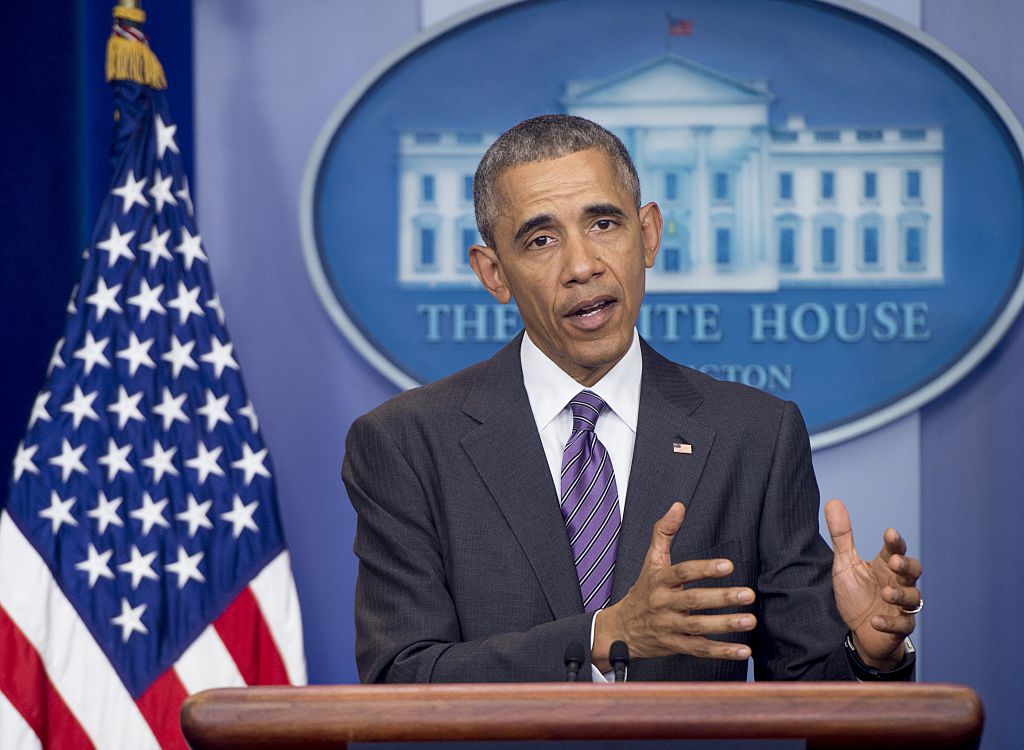Obama calls TPP the best chance for America, not China, to 'call the shots' on global trade


A free daily email with the biggest news stories of the day – and the best features from TheWeek.com
You are now subscribed
Your newsletter sign-up was successful
The politics were tough when President Obama wrapped up negotiations on the Trans-Pacific Partnership trade deal between the U.S. and 11 other Pacific Rim nations last fall, and they have only gotten worse since. The two presidential frontrunners, Hillary Clinton and Donald Trump, both oppose the deal, as do Sen. Bernie Sanders and many other Democrats in Congress. Obama promoted the TPP in a Washington Post op-ed published late Monday, clearly aware of the anti-trade flavor of the presidential race.
The Asia-Pacific region "is on its way to becoming the most populous and lucrative market on the planet," Obama wrote. "Increasing trade in this area of the world would be a boon to American businesses and American workers, and it would give us a leg up on our economic competitors, including one we hear a lot about on the campaign trail these days: China." China knows that, which is why it is furiously trying to negotiate a competing trade deal, the Regional Comprehensive Economic Partnership, by the end of the year, Obama said, saying China's pact would "carve up some of the fastest-growing markets in the world at our expense, putting American jobs, businesses, and goods at risk."
TPP, on the other hand, "puts American workers first and makes sure we write the rules of the road for trade in the 21st century," Obama argued, listing some benefits, from eliminating tariffs for U.S.-made goods to strengthening America's national security. Then he returned to the 2016 campaign:
The Week
Escape your echo chamber. Get the facts behind the news, plus analysis from multiple perspectives.

Sign up for The Week's Free Newsletters
From our morning news briefing to a weekly Good News Newsletter, get the best of The Week delivered directly to your inbox.
From our morning news briefing to a weekly Good News Newsletter, get the best of The Week delivered directly to your inbox.
I understand the skepticism people have about trade agreements, particularly in communities where the effects of automation and globalization have hit workers and families the hardest. But building walls to isolate ourselves from the global economy would only isolate us from the incredible opportunities it provides. Instead, America should write the rules. America should call the shots. Other countries should play by the rules that America and our partners set, and not the other way around. [Obama, The Washington Post]
He ended acknowledging that another clock is ticking. "My administration is working closely with leaders in Congress to secure bipartisan approval for our trade agreement, mindful that the longer we wait, the harder it will be to pass the TPP," he wrote, concluding: "Let’s seize this opportunity, pass the Trans-Pacific Partnership and make sure America isn’t holding the bag, but holding the pen." You can read the whole op-ed at The Washington Post.
A free daily email with the biggest news stories of the day – and the best features from TheWeek.com
Peter has worked as a news and culture writer and editor at The Week since the site's launch in 2008. He covers politics, world affairs, religion and cultural currents. His journalism career began as a copy editor at a financial newswire and has included editorial positions at The New York Times Magazine, Facts on File, and Oregon State University.
-
 The EU’s war on fast fashion
The EU’s war on fast fashionIn the Spotlight Bloc launches investigation into Shein over sale of weapons and ‘childlike’ sex dolls, alongside efforts to tax e-commerce giants and combat textile waste
-
 How to Get to Heaven from Belfast: a ‘highly entertaining ride’
How to Get to Heaven from Belfast: a ‘highly entertaining ride’The Week Recommends Mystery-comedy from the creator of Derry Girls should be ‘your new binge-watch’
-
 The 8 best TV shows of the 1960s
The 8 best TV shows of the 1960sThe standout shows of this decade take viewers from outer space to the Wild West
-
 TikTok secures deal to remain in US
TikTok secures deal to remain in USSpeed Read ByteDance will form a US version of the popular video-sharing platform
-
 Unemployment rate ticks up amid fall job losses
Unemployment rate ticks up amid fall job lossesSpeed Read Data released by the Commerce Department indicates ‘one of the weakest American labor markets in years’
-
 US mints final penny after 232-year run
US mints final penny after 232-year runSpeed Read Production of the one-cent coin has ended
-
 Warner Bros. explores sale amid Paramount bids
Warner Bros. explores sale amid Paramount bidsSpeed Read The media giant, home to HBO and DC Studios, has received interest from multiple buying parties
-
 Gold tops $4K per ounce, signaling financial unease
Gold tops $4K per ounce, signaling financial uneaseSpeed Read Investors are worried about President Donald Trump’s trade war
-
 Electronic Arts to go private in record $55B deal
Electronic Arts to go private in record $55B dealspeed read The video game giant is behind ‘The Sims’ and ‘Madden NFL’
-
 New York court tosses Trump's $500M fraud fine
New York court tosses Trump's $500M fraud fineSpeed Read A divided appeals court threw out a hefty penalty against President Trump for fraudulently inflating his wealth
-
 Trump said to seek government stake in Intel
Trump said to seek government stake in IntelSpeed Read The president and Intel CEO Lip-Bu Tan reportedly discussed the proposal at a recent meeting
